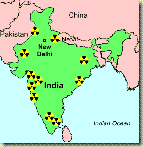 Inching, yes, but given that congress has been otherwise engaged during the last week, we'll take it:
Inching, yes, but given that congress has been otherwise engaged during the last week, we'll take it:
The US House of Representatives has approved a landmark nuclear deal with India, removing one of two final obstacles to a foreign policy victory for the Bush administration.
While the House approved the deal 298-117 on Saturday, it still faces a hurdle in the Senate. Several senators oppose the deal and could attempt to block a vote in the few days left before Congress recesses ahead of the November elections.
As The Financial Times' Demetri Sevastopulo points out above, The Senate still has to come through and may not:
But the final clinching step remains the approval of the Senate where a senator anonymously put a ``hold’’ on consideration of the bill in a tactic aimed at delaying the vote. Sources were confident that the Senate step would be completed soon and that there could be movement in the Senate as early as Monday.
As of right now, though, nothing in the Senate. We'll keep an eye on it and report back. Even if Congress adjourns without finishing action on the bill, the clock might still run long enough for the bill to pass if it isn't explicitly voted down. That's a long shot, though, so we'll see if the Senate acts before voting on the financial bailout and skipping town.
A map of India's nuclear facilities. See here for what they are and what they do.
Comments